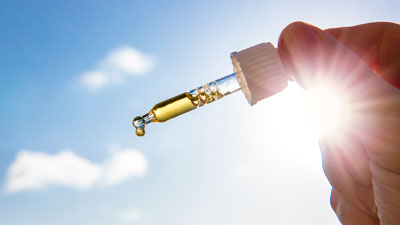
So many of our body functions depend on having appropriate levels of vitamin D. It supports our bones by enhancing calcium absorption and helping us maintain adequate levels of calcium and phosphorus. Vitamin D helps regulate our immune system; it’s a strong antioxidant that can help reduce the growth of cancer cells, and it helps reduce inflammation. Plus, it supports our brain health from its initial development during pregnancy and throughout our lives, helping us against depression, anxiety, mental disorders, and even against dementia, Alzheimer’s disease, and Parkinson’s disease. And it also aids our muscles by supporting glucose absorption and energy production, muscle regeneration, and by decreasing oxidative stress.
Vitamin D is a nutrient that we can make ourselves when we’re exposed to the sun’s ultraviolet B rays or UVB. The problem is that we can’t always get the exposure we need. Maybe we don’t live where it is sunny all year round. Maybe our town is polluted. Or maybe we simply don’t spend enough time outside (15 to 30 minutes a day while wearing short sleeves) or when we do, we’re using sunblock to protect our skin. Because of all these reasons, many doctors recommend taking vitamin D supplements.
Wondering if there are any good plant-based sources? See below for more info. Plus, try our personalized calculator to see how much vitamin D you and your loved ones need. And check out some interesting facts about vitamin D supplements.
Vitamin D Personalized Calculator
See how much vitamin D you and each member of your family needs. Getting your personalized nutrition values will give you a better idea of how to select your family’s supplements to ensure everyone gets what they need but not too much to avoid toxicity.
Terminology:
- Daily Value (DV): The recommended amount of nutrients to consume each day for individuals who are 4 years old or older.
- Recommended Daily Allowance (RDA): The recommended amount of nutrients to consume each day according to the individual’s age, gender, and whether a woman is pregnant or breastfeeding.
- Upper Intake Level (UL): The highest amount of nutrient intake that will not pose adverse health effects on most individuals.
Important Things to Know
Hover over each of the interesting facts below to flip the tiles and learn more details.



